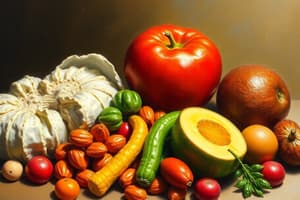Podcast
Questions and Answers
What is the role of the digestive system?
What is the role of the digestive system?
- To synthesize enzymes for digestion
- To filter blood and store nutrients
- To absorb oxygen from the food
- To break down food for nutrient absorption (correct)
Which process does NOT involve enzymes?
Which process does NOT involve enzymes?
- Physical digestion (correct)
- Chemical digestion
- Metabolism
- Absorption
What is the primary function of peristalsis in the digestive system?
What is the primary function of peristalsis in the digestive system?
- To push food down the digestive tract (correct)
- To break down nutrients into simpler forms
- To store undecomposed food
- To absorb water and electrolytes
Which organ is NOT part of the alimentary canal?
Which organ is NOT part of the alimentary canal?
Which of the following represents the correct order of the digestive process?
Which of the following represents the correct order of the digestive process?
What type of digestion occurs in the small intestine?
What type of digestion occurs in the small intestine?
How long is the total length of the alimentary canal approximately?
How long is the total length of the alimentary canal approximately?
What is churning in the context of the digestive system?
What is churning in the context of the digestive system?
What is the average recommended daily water intake for a person?
What is the average recommended daily water intake for a person?
Which of the following is not a function of water in the body?
Which of the following is not a function of water in the body?
What can occur if the water that is lost from the body is not replaced?
What can occur if the water that is lost from the body is not replaced?
How does a balanced diet affect physical health?
How does a balanced diet affect physical health?
Which group should constitute about half of the plate according to the MyPlate guide?
Which group should constitute about half of the plate according to the MyPlate guide?
What is the role of bile in digestion?
What is the role of bile in digestion?
What is a potential consequence of overeating?
What is a potential consequence of overeating?
Which nutrient is primarily responsible for repairing and building new tissues?
Which nutrient is primarily responsible for repairing and building new tissues?
Which enzyme is responsible for breaking down maltose into glucose?
Which enzyme is responsible for breaking down maltose into glucose?
What can excessive intake of fat lead to?
What can excessive intake of fat lead to?
What is the main function of lipase in the digestive process?
What is the main function of lipase in the digestive process?
Where does the final breakdown of food occur?
Where does the final breakdown of food occur?
What is the role of villi in the small intestine?
What is the role of villi in the small intestine?
Which enzymes are secreted by the glands on the ileum wall?
Which enzymes are secreted by the glands on the ileum wall?
Which substance is NOT broken down by pancreatic juice?
Which substance is NOT broken down by pancreatic juice?
What happens to the absorption of nutrients in the jejunum and ileum?
What happens to the absorption of nutrients in the jejunum and ileum?
Which type of nutrient is categorized as a macronutrient?
Which type of nutrient is categorized as a macronutrient?
What are carbohydrates primarily composed of?
What are carbohydrates primarily composed of?
Which of the following is NOT a type of carbohydrate?
Which of the following is NOT a type of carbohydrate?
What distinguishes simple carbohydrates from complex carbohydrates?
What distinguishes simple carbohydrates from complex carbohydrates?
Which of the following is a type of micronutrient?
Which of the following is a type of micronutrient?
Which type of simple carbohydrate consists of two sugar units?
Which type of simple carbohydrate consists of two sugar units?
Why are macronutrients important for the body?
Why are macronutrients important for the body?
What role does water play in the nutrient framework?
What role does water play in the nutrient framework?
What can result from recurrent exposure to acidic content in the oesophagus?
What can result from recurrent exposure to acidic content in the oesophagus?
Which risk factor is associated with the development of digestive tract cancers?
Which risk factor is associated with the development of digestive tract cancers?
What is a common symptom of Irritable Bowel Syndrome (IBS)?
What is a common symptom of Irritable Bowel Syndrome (IBS)?
Which of the following is a treatment strategy for lactose intolerance?
Which of the following is a treatment strategy for lactose intolerance?
What is a symptom of a hiatal hernia?
What is a symptom of a hiatal hernia?
Which lifestyle change can help manage symptoms of IBS?
Which lifestyle change can help manage symptoms of IBS?
What complicates Barrett's oesophagus?
What complicates Barrett's oesophagus?
Which of the following is NOT a common symptom of lactose intolerance?
Which of the following is NOT a common symptom of lactose intolerance?
Flashcards are hidden until you start studying
Study Notes
Nutrients
- Carbohydrates, proteins, and fats are the three main types of macronutrients.
- Macronutrients are required in large quantities to support a healthy body.
- Carbohydrates are organic compounds made up of carbon, hydrogen, and oxygen.
- Different types of food contain varying amounts of specific nutrients.
- Water makes up 60% to 70% of our body mass.
- An adequate water intake is crucial for maintaining proper body processes.
Carbohydrates
- Carbohydrates are composed of sugar molecule units, also known as saccharides.
- There are two types of carbohydrates: simple and complex.
- Simple carbohydrates like monosaccharides (glucose, fructose, galactose) and disaccharides (sucrose, lactose, maltose) are found in fruits, table sugar, and milk.
- Complex carbohydrates like polysaccharides (starch and fiber) are found in grains, legumes, and vegetables.
Functions of Water
- Enables the breakdown of food substances during digestion.
- Dissolves nutrients and transports them throughout the body.
- Excretes waste through sweat and urine.
- Regulates body temperature.
- Serves as a primary component of cells and blood plasma.
- Facilitates transportation of respiratory gases and nutrients.
- Forms a medium for cellular biochemical reactions.
Balanced Diet
- A balanced diet supplies all essential nutrients and energy requirements.
- It includes carbohydrates, fats, proteins, vitamins, minerals, and water in the correct proportions.
- A balanced diet varies depending on individual needs, health conditions, and lifestyle.
- The MyPlate guide emphasizes fruits and vegetables as half of the food plate serving.
Healthy Meals
- Fruit salad, Gado-gado, Nasi pecel.
Unhealthy Meals
- Fast Food, Instant noodle, Sweet food.
Digestive System
- The digestive system breaks down food into absorbable molecules for cells.
- Physical digestion involves mechanical breakdown without enzymes.
- Chemical digestion involves enzyme-mediated breakdown of complex molecules.
- The digestive tract, or alimentary canal, extends from the mouth to the anus.
Types of Digestion
Physical Digestion
- Takes place in the mouth, esophagus, stomach, and small intestine.
- Involves peristalsis (wave-like muscle contractions) and churning (squeezing and mixing).
Chemical Digestion
- Occurs in the mouth, stomach, and small intestine.
- Breakdown of complex food molecules into simple molecules using enzymes.
Parts of the Digestive System
- The digestive system includes the alimentary canal and accessory organs (liver, gallbladder, pancreas).
Digestion of Carbohydrates
- Pancreatic amylase breaks down starch into maltose.
- Maltase breaks down maltose into glucose.
- Sucrase breaks down sucrose into glucose and fructose.
- Lactase breaks down lactose into glucose and galactose.
Digestion of Proteins
- Pepsin in the stomach breaks down proteins into polypeptides.
- Trypsin in the small intestine breaks down polypeptides into peptides.
- Erepsinin the small intestine breaks down peptides into amino acids.
Digestion of Fats
- Lipase in the stomach and small intestine breaks down fats into fatty acids and glycerol.
Absorption of Digested Food
- The small intestine is adapted for nutrient absorption due to its length, folds, and villi.
- Villi increase the surface area for nutrient absorption.
- Blood capillaries in villi transport glucose, amino acids, and water-soluble vitamins.
- Lymph vessels in villi transport fatty acids and glycerol.
Digestive Tract Cancers
- Digestive tract cancers may affect the esophagus, stomach, and intestines.
- Symptoms might include weight loss, abdominal pain, and bowel habit changes.
- Risk factors include age, genetics, smoking, and diet.
- Screening tests, like colonoscopies, help detect precancerous lesions.
- Treatment involves surgery, chemotherapy, and radiation therapy.
Irritable Bowel Syndrome (IBS)
- IBS is a functional bowel disorder causing abdominal pain, bloating, and altered bowel habits.
- Symptoms are influenced by stress and dietary patterns.
- Managing IBS involves lifestyle changes like stress reduction and balanced meals.
- Increasing fiber intake through fruits, vegetables, and whole grains helps.
- Medications can be used to ease specific symptoms.
Lactose Intolerance
- Lactose intolerance results from difficulties digesting lactose, the sugar in milk.
- Symptoms include bloating, diarrhea, and abdominal pain after dairy consumption.
- Controlling lactose intake, with lactose-free alternatives or lactase supplements, is crucial.
Hiatal Hernia
- In a hiatal hernia, the stomach protrudes into the chest through the diaphragm.
- Symptoms include acid reflux, chest pain, and difficulty swallowing.
- Treatment involves lifestyle modifications and, in severe cases, surgery.
Studying That Suits You
Use AI to generate personalized quizzes and flashcards to suit your learning preferences.



